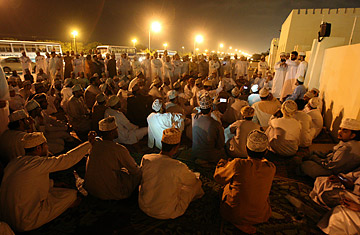
Omani protesters hold a sit-in outside the sultanate's consultative council in Muscat on March 1, 2011 to demand an end to corruption in the Gulf state.
(2 of 2)
"We want to send a message to the government," a mustachioed older man with an intricately embroidered black and white cap says.
"The government? The dishdasha you are wearing is because of petrol," the interloper says.
"No, I have got nothing from the government. It is the ministers who see the money."
The Toyota driver turns away to another group seated elsewhere. "What? Do you want to be hit by the police?" he asks them. "Why do you think you have the right to block a road, a public road, and say nobody can pass because you are demonstrating?"
"So is the solution to shoot us with live fire?" asks Ahmad al-Rubke, 31, a physics teacher.
"I don't believe that," the man responds. "It's not true."
"Please will you leave us now?" the older man with the black-and-white cap says. "Don't stir them up." The interloper obliges as the protesters talk among themselves.
"He has the right to free expression," Rubke says. "He must be security," says Moayad al-Rashdi, who is seated cross-legged near him. "I think he was shocked by our views," says another, "but don't let him shake you."
Most of this core group of protesters are educated, employed men in well-paid jobs, but a few are like Moussa al-Amri, 23, a taxi driver who has slept in this encampment for the past five nights. Omanis, unlike locals in other Gulf Arab states, work as waiters and bellhops, in retail stores and restaurants, jobs traditionally considered beneath the citizens of oil-rich autocracies in places like the United Arab Emirates, where such work is undertaken by an army of foreign workers.
"We'll do the work, any work," says Amri, "but we need good wages." He says 350 rials ($909) should be the minimum public sector wage, a figure that was 140 ($364) before last month when the Sultan, in a bid to ease tensions, upped it to 200 rials. The sultan has also promised 50,000 new jobs, unemployment benefits of $390 a month, and reshuffled his cabinet.
But it's not enough for these protesters and others like them across the country who say real reforms are about more than just a bottom-line figure. They want an end to wasta, or political favoritism, a scourge across the Middle East that sees the well-connected get better jobs and opportunities. It is a simmering class issue between wealthy Omanis close to the establishment, and everyone else.
"Where is my freedom?" says Rubke. "I'm not asking the sultan to give us a lot of money, freedom means I can vote for a constitution, have a government and a say in policies." The elected Majlis as-shura, the men all say, has no real power. "Where is freedom of the press?" asks Rashdi. "We have three newspapers but they're really only one." The local press has largely ignored these protests, focusing instead on demonstrations of loyalty to the sultan. "If you are loyal to the nation and the sultan, come here, join us," says Rashdi.
The group, like their counterparts across the Arab world, are using Facebook to mobilize. But they don't appear to be as hardcore as other Arab revolutionaries, perhaps because the Sultan is more of a benevolent dictator than other now ousted Arab leaders. "His majesty has made some good steps," says Ruqeishi, the electricity utility employee. "But they don't go far enough to put on hold these people's demands for faster action. We must all bare the responsibility of decades of inaction in the Middle East," he says. "Now we want results."
